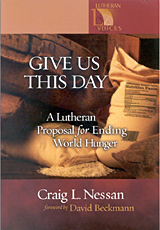"To pay attention to the cries of the poor in the world around us is to have our ecclesial business-as-usual interrupted as by a scream. How would you respond this very hour if even a few of the suffering hungry ones of this world stood as onlookers to your proceedings from the edges of your room? How would you be forced to think and act differently by virtue of being in the physical presence of even a single one who is starving? We could not continue per usual but would be forced to stop what we are doing and minister to that one. . . .
"The evil of hunger deserves urgent attention from the church. The pervasiveness of hunger — 800 million hungry human beings — forces us to think in terms of numbers that boggle the imagination. If we rightly stand aghast at a system that manufactured the holocaust of six million Jews, how is it we fail to be scandalized by the death today of 30,000 children from hunger-related causes? . . . .
"As members of a church, how can we theologically and morally tolerate a status quo in which the reality of 800 million malnourished human beings is considered 'normal' and 'acceptable'? . . . .
"In our capacity as church, given the immensity of human suffering due to hunger and given the clarity of the biblical witness concerning justice for the poor, we have as our first obligation to speak boldly and consistently about the need to attend first to the needs of the hungry and to advocate for systemic change to ensure priority is given to their needs.”
